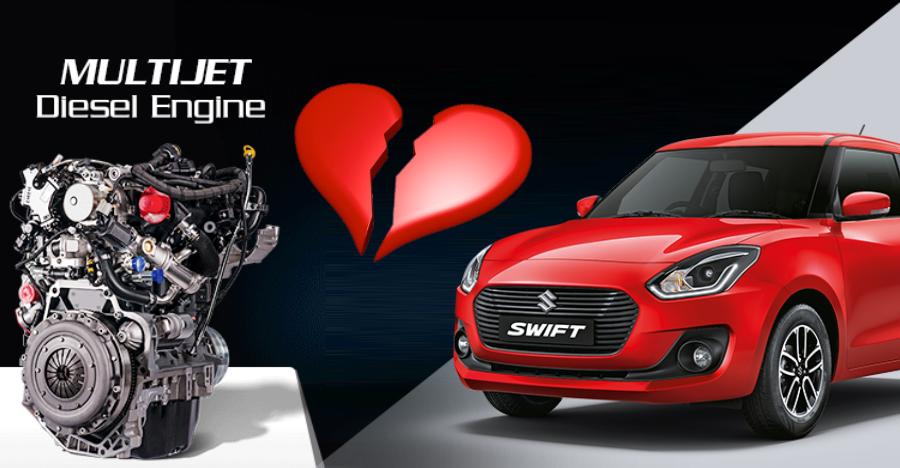Maruti Suzuki to stop building Multijet diesel engines used by Swift, Dzire, Brezza & more


Maruti Suzuki is said to stop building the Multijet diesel engine from its Gurgaon factory. This big development comes at a time when there are rumours that diesel engines on small cars may be going the way of the dodo thanks to a steep increase in costs. According to LiveMint, The diesel engine factory could be converted to produce petrol engines even as Maruti Suzuki is yet to confirm this development.
There are so many cars in India that use a single diesel engine – the 1.3 liter Fiat Multijet unit – that it’s jocularly known as the ‘national engine’ of India. Sample this. The Maruti Swift, Dzire, Baleno, Vitara Brezza, Ertiga, Ciaz and S-Cross – all use the 1.3 liter Fiat Multijet turbocharged diesel engine. These cars make up for more than 50 % of all diesel cars sold in India. And the numbers gets even more expansive if car makers such as Tata Motors and Fiat, and their cars using the Multijet engine, are included.
In the near term – next 3-5 years – Maruti Suzuki plans to shift to a new, in-house diesel engine. The new motor – developed by Suzuki – will displace 1.5 liters and will replace the 1.3 liter Fiat Multijet diesel engine across Maruti’s range. What this means, the likes of the Maruti Swift, Dzire, Baleno, Vitara Brezza, Ertiga, Ciaz and S- Cross will shift to the 1.5 liter turbocharged diesel engine. In the long term (5 years+), Maruti may steer clear of diesel engines altogether. Will this shift signal the end of diesels? There’s a good chance of this happening.
Already, voices right from the top of Maruti Suzuki have revealed that diesel engined cars may get too expensive in the Bharat Stage 6 emission norms regime. In fact, the engineering head of Maruti Suzuki, Mr. CV Raman had recently noted that the price difference between BS6 compliant diesel engined and petrol engined cars could be up to Rs. 2.5 lakhs. This is likely to make diesel engined cars too expensive for private car buyers, making the fuel option suitable only for cab operators.
Private car buyers are expected to shift towards petrol engined cars and other dual fuel options such as petrol-LPG and petrol-CNG. For now, full-hybrid petrol cars – which are likely to be as fuel efficient as BS6 diesel engined cars – are said to be too costly for mass adoption. Prices of petrol-hybrid cars – according to Maruti Suzuki chairman Mr.RC Bhargava – could be Rs. 2.5 lakhs costlier than regular petrol cars, which means that full petrol-hybrids will cost the same as BS6 diesels, at least for now.
Maruti Suzuki is also working on electric cars. The automaker’s first electric car – the all-new WagonR Electric – is scheduled to make its debut during 2020. On-road testing of the car has already commenced, and Maruti Suzuki is expected to launch the car at an affordable price point, well under Rs. 10 lakhs. However, the mass adoption/shift towards electric cars is still at least half a decade away considering the fact that electric vehicle recharging infrastructure is still in its infancy in India, and so is affordably priced electric cars.